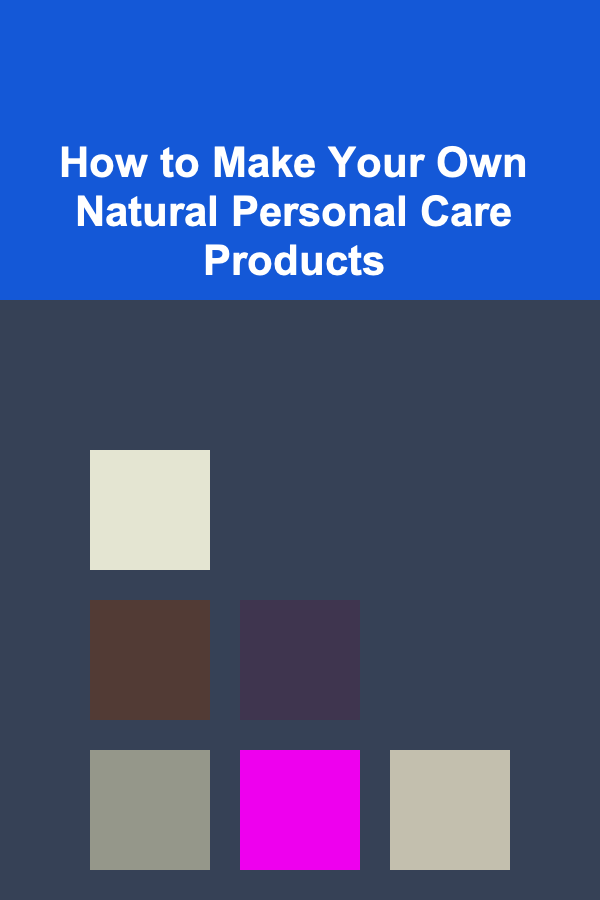
How to Make Your Own Natural Personal Care Products
ebook include PDF & Audio bundle (Micro Guide)
$12.99$10.99
Limited Time Offer! Order within the next:

In recent years, there has been a growing shift towards natural and homemade alternatives in the personal care industry. Consumers are increasingly seeking out products that are free from harmful chemicals, artificial additives, and preservatives. As a result, making your own natural personal care products has gained popularity not only as a cost-effective option but also as a means to ensure the quality and safety of the products you use on your skin and hair.
Creating your own natural personal care products can be an empowering experience, giving you control over what goes into the products you apply to your body. In this comprehensive guide, we'll explore the benefits of homemade natural products, the essential ingredients and tools you need, and detailed instructions on how to create a variety of personal care items, from soaps to face masks.
The Benefits of Natural Personal Care Products
Before diving into the process of creating your own products, it's important to understand the advantages of using natural personal care items.
1. Healthier for Your Skin
Many commercial personal care products contain synthetic chemicals, fragrances, and preservatives that can be harsh on your skin. These ingredients can cause irritation, dryness, or even allergic reactions. By making your own natural products, you can ensure they are made from gentle, nourishing ingredients that benefit your skin, such as essential oils, herbs, and natural butters.
2. Environmental Impact
Many mass-produced personal care products come in plastic packaging that contributes to environmental pollution. Homemade products often require less packaging, and when packaging is necessary, you can opt for eco-friendly materials like glass, aluminum, or recycled containers.
3. Cost-Effective
Commercial skincare products can be expensive, especially if you're seeking high-quality organic or natural items. By making your own, you can save a significant amount of money in the long term. Additionally, many natural ingredients are versatile and can be used in multiple products.
4. Customization
One of the biggest advantages of making your own personal care products is the ability to customize them to suit your specific needs. You can select ingredients based on your skin type, personal preferences, and sensitivities. If you have dry skin, for example, you can make a rich moisturizer with oils like coconut or argan oil. For acne-prone skin, you can create a gentle cleanser with tea tree oil.
5. Control Over Ingredients
By making your own products, you have complete control over what goes into them. This is particularly important for people with sensitive skin, allergies, or those who prefer to avoid certain chemicals or fragrances that are commonly found in commercial products.
Essential Ingredients for Natural Personal Care Products
Before you begin making your own natural products, it's important to familiarize yourself with some of the key ingredients that are commonly used in homemade personal care recipes. These ingredients are known for their versatility and effectiveness in skincare, haircare, and overall personal hygiene.
1. Carrier Oils
Carrier oils serve as the base for many natural products. They are often used to dilute essential oils and provide moisture and nourishment to the skin. Some popular carrier oils include:
- Coconut Oil: Known for its moisturizing properties, coconut oil is great for dry skin and hair.
- Jojoba Oil: A lightweight oil that closely resembles the skin's natural oils, making it perfect for all skin types.
- Argan Oil: Rich in vitamin E, argan oil is often used to nourish and hydrate the skin and hair.
- Olive Oil: A staple in many DIY products, olive oil is known for its moisturizing and anti-inflammatory properties.
2. Essential Oils
Essential oils are concentrated plant extracts that provide fragrance as well as therapeutic benefits. They are often added to personal care products for their aromatherapy effects. Some popular essential oils include:
- Lavender Oil: Known for its calming properties, lavender is great for reducing stress and promoting relaxation.
- Tea Tree Oil: A natural antiseptic, tea tree oil is commonly used to treat acne and other skin conditions.
- Peppermint Oil: Used for its cooling and soothing properties, peppermint oil is often added to hair care products for its invigorating effect.
- Rosemary Oil: Known to stimulate hair growth, rosemary oil is commonly used in scalp treatments and hair masks.
3. Natural Butters
Butters are rich, nourishing ingredients that provide deep hydration to the skin. Some popular natural butters include:
- Shea Butter: Known for its moisturizing and anti-inflammatory properties, shea butter is often used in body creams and lip balms.
- Cocoa Butter: A rich, emollient butter that is perfect for dry skin and often used in body lotions and balms.
- Mango Butter: Lighter than shea and cocoa butters, mango butter is ideal for moisturizing without being greasy.
4. Clays and Powders
Clays and powders are often used in facial masks, scrubs, and bath products. They are excellent for detoxifying the skin and providing gentle exfoliation. Some popular clays and powders include:
- Bentonite Clay: Known for its ability to draw out impurities and toxins from the skin, bentonite clay is a popular ingredient in detoxifying face masks.
- Kaolin Clay: A gentle clay that is great for sensitive skin, kaolin clay is often used in masks and cleansers.
- Oatmeal: Ground oats are gentle on the skin and can help to soothe irritation, making them ideal for sensitive or inflamed skin.
5. Natural Exfoliants
Exfoliation is an important step in any skincare routine, and natural exfoliants help remove dead skin cells without causing irritation. Some common natural exfoliants include:
- Sugar: Granulated sugar is a gentle exfoliant that works well for body scrubs.
- Sea Salt: Coarse sea salt is ideal for more intense exfoliation, especially for rough patches like elbows and feet.
- Coffee Grounds: Used in body scrubs, coffee grounds help improve circulation and leave the skin feeling refreshed.
Tools You Will Need
To get started with making your own natural personal care products, you will need a few basic tools. These tools will help you mix, store, and package your creations.
1. Mixing Bowls
Glass or stainless steel mixing bowls are ideal for combining ingredients. Avoid using plastic, as it may react with some ingredients.
2. Measuring Spoons and Cups
Accurate measurements are essential when making personal care products. Make sure you have a set of measuring spoons and cups to ensure the proper proportions of ingredients.
3. Double Boiler
A double boiler is useful for melting butters and waxes without overheating them. If you don't have a double boiler, you can create a makeshift one using a heatproof bowl over a pot of simmering water.
4. Mixing Utensils
Wooden or stainless steel spatulas and spoons are best for stirring your mixtures. Avoid using plastic, as it can leach chemicals into your products.
5. Storage Containers
Glass jars, bottles, or tins are great for storing your homemade products. Ensure the containers are clean and dry before use, and label them with the ingredients and date of creation.
Recipes for Homemade Natural Personal Care Products
1. DIY Natural Lip Balm
This simple lip balm recipe is perfect for dry, chapped lips and can be customized with your favorite essential oils.
Ingredients:
- 1 tablespoon of beeswax pellets
- 1 tablespoon of coconut oil
- 1 tablespoon of shea butter
- 10-15 drops of essential oil (lavender or peppermint)
Instructions:
- Melt the beeswax, coconut oil, and shea butter in a double boiler.
- Once melted, remove from heat and add essential oils.
- Pour the mixture into small lip balm containers and let it cool.
2. Homemade Face Mask for Oily Skin
This face mask is perfect for those with oily skin, as it helps to absorb excess oil and prevent breakouts.
Ingredients:
- 2 tablespoons of bentonite clay
- 1 tablespoon of apple cider vinegar
- 1 tablespoon of honey
Instructions:
- Mix the bentonite clay and apple cider vinegar in a bowl until it forms a paste.
- Add honey and mix well.
- Apply the mask to your face and leave it on for 10-15 minutes before rinsing with warm water.
3. Natural Deodorant
This natural deodorant recipe helps to neutralize odors without the use of aluminum or harsh chemicals.
Ingredients:
- 3 tablespoons of coconut oil
- 2 tablespoons of baking soda
- 2 tablespoons of arrowroot powder
- 10-15 drops of essential oil (lavender or tea tree)
Instructions:
- Melt the coconut oil in a double boiler.
- Mix the baking soda and arrowroot powder in a bowl.
- Combine all the ingredients and stir well.
- Pour into a small container and let it set in the fridge for a few hours.
4. DIY Shampoo for Dry Hair
This natural shampoo recipe is great for dry hair and helps to moisturize and nourish the scalp.
Ingredients:
- 1/4 cup of castile soap
- 1/4 cup of aloe vera gel
- 1 tablespoon of coconut oil
- 10 drops of lavender essential oil
Instructions:
- Mix the castile soap, aloe vera gel, and coconut oil in a bottle.
- Add the lavender essential oil and shake well to combine.
- Use as you would any regular shampoo, applying to damp hair and massaging into the scalp.
Conclusion
Making your own natural personal care products is a rewarding and eco-friendly alternative to purchasing commercial products filled with chemicals and preservatives. With just a few basic ingredients and tools, you can create a wide variety of products tailored to your specific needs, from moisturizers to face masks and haircare items.
The benefits of using natural products---such as healthier skin, a reduced environmental impact, and cost savings---make it a worthwhile endeavor. Plus, by customizing your personal care routine, you can enjoy the satisfaction of knowing exactly what goes into the products you use every day. So, whether you are new to DIY skincare or a seasoned pro, there's no better time to start making your own natural products!
Reading More From Our Other Websites
- [Organization Tip 101] How to Use Labels to Identify Craft Supply Containers
- [Home Budget 101] How to Manage Your Home Budget While Living with Roommates
- [Home Holiday Decoration 101] How to Create a Warm, Inviting Holiday Atmosphere with Candles
- [Home Storage Solution 101] How to Go Vertical: Creative Shoe Rack Ideas to Save Floor Space
- [Organization Tip 101] Step-by-Step Guide to Staining Your Deck with the Right Products
- [Personal Investment 101] Make Money by Teaching Deep Learning: Creating Online Courses
- [Home Budget 101] How to Save for a Dream Home While Staying on Budget
- [Home Maintenance 101] How to Maintain Your Home's Water Pressure System
- [Home Budget Decorating 101] How to Use Mirrors to Create the Illusion of Space
- [Home Renovating 101] How to Choose the Right Paint Sheen for Every Room in Your Home

How to Build Credit from Scratch in Your 20s
Read More
How to Set Up a Family Fitness Routine for All Ages
Read More
How to Utilize Hidden Storage in Your Furniture for More Space
Read More
Practical Tips for Cutting Down on Impulse Online Shopping
Read More
Time Blocking for Entrepreneurs: Maximize Your Productivity
Read More
How to Decorate a Halloween Party on a Budget
Read MoreOther Products

How to Build Credit from Scratch in Your 20s
Read More
How to Set Up a Family Fitness Routine for All Ages
Read More
How to Utilize Hidden Storage in Your Furniture for More Space
Read More
Practical Tips for Cutting Down on Impulse Online Shopping
Read More
Time Blocking for Entrepreneurs: Maximize Your Productivity
Read More